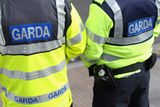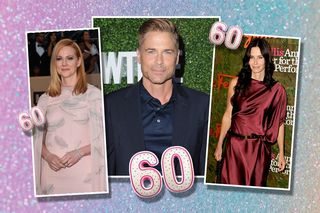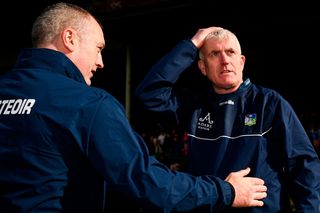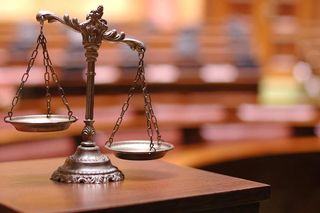The People’s Flag: 1923: Ireland joins the League of Nations – an inquiry focus for senior students
Lesson plan 1
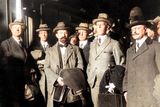
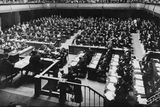
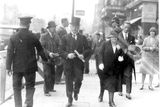
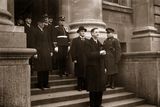
The first Dáil in April 1919 optimistically discussed the rationale of attempting to join the League of Nations. The ambition became reality on the 10th of September 1923, as the Irish Free State was admitted and in doing so created a platform for Irish voice on an international stage.
How that voice would be used would manifest in registering the Anglo-Irish treaty internationally, maintaining peaceful yet strained Anglo-Irish relations, advocating for peace and in more recent times under the guide of the United Nations, international peace-keeping missions.
League of Nations meeting in Geneva, 1923
As the emerging Irish Free State created the structures of sovereignty its attention turned to the world stage, at the core, a yearning for recognition of its sovereignty and validation of its own incipient voice in international affairs. Joining the League of Nations marked a pivotal moment in its international relations and post-independence trajectory.
After centuries of colonial rule by the British, Ireland had finally gained restricted independence in 1922 following the Anglo-Irish Treaty. Aiming to assert its sovereignty and establish itself as a respected member of the international community would take time and skill.
Key figures involved in Ireland’s decision to join the League of Nations included statesmen such as Eamon de Valera and W.T. Cosgrave, who served as President of the Executive Council of the Irish Free State, Minister for external affairs, Mr Desmond FitzGerald and George Gavan Duffy, who represented Ireland at the League of Nations Assembly in Geneva.
WT Cosgrave at the reopening of the GPO
Sean Lester also served as the League’s last secretary general before its dissolution in 1946 (As the United Nations took its place).Their leadership and diplomatic skills were instrumental in navigating the complexities of international relations and securing Ireland’s position in the League.
Also attractive to Ireland was the opportunity to participate in a forum that promoted peace and diplomacy among nations.
Given Ireland’s history of conflict with Britain and its desire to maintain peaceful relations with its neighbours, membership in the League provided a platform for Ireland to engage in multilateral diplomacy and to resolve disputes through negotiation rather than resorting to violence which had plagued its recent past.
First Taoiseach of Eire Eamon de Valera (1882 - 1975), takes the salute on the steps of the government buildings in Dublin, after finalising the new Irish constitution
In joining the League, Ireland had access to international resources and expertise that could aid in its economic development and nation-building efforts. As a small, newly independent state, Ireland could benefit from the technical assistance and financial support provided by the League for various social and economic programs, such as public health initiatives, infrastructure development, and agricultural reforms.
In the long term, Ireland’s membership in the League of Nations helped to solidify its status as an independent nation-state and facilitated its integration into the international community.
By actively participating in League initiatives and contributing to its various committees and commissions, Ireland gained recognition and respect from other member states, further legitimising its sovereignty and right to self-determination. Conversely, Ireland’s experience in the League of Nations also highlighted the limitations of international organisations in addressing conflicts and preventing war.
Ireland’s brief tenure in the League of Nations laid the groundwork for its subsequent engagement in other international organisations, such as the United Nations
Despite its commitment to collective security and disarmament, the League ultimately failed to prevent the outbreak of World War II, underscoring the challenges of maintaining peace in a world fraught with geopolitical tensions and competing interests.
Nevertheless, Ireland’s brief tenure in the League of Nations laid the groundwork for its subsequent engagement in other international organisations, such as the United Nations, where it continues to play an active role in promoting peace, security, and human rights on the global stage.
Through its participation in multilateral forums, Ireland reaffirms its commitment to the principles of international cooperation and solidarity, reflecting its enduring legacy as a small but influential voice in the community of nations.
This lesson is set for senior students who will focus on investigation, enhancing research skills, evaluating sources, analysing source provenance, and using the Internet ethically. It may be assimilated into a Transition Year module or modified for senior students studying the Pursuit of Sovereignty and Partition. I have tried to allow for maximum flexibility to both teacher and learner. In our hands the future is shaped, and the past understood.
Join the Irish Independent WhatsApp channel
Stay up to date with all the latest news















